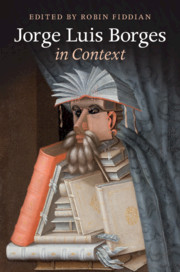Book contents
- Jorge Luis Borges in Context
- Jorge Luis Borges in Context
- Copyright page
- Contents
- Illustrations
- Contributors
- Acknowledgements
- Permissions
- Note on Primary Sources and Editions Used
- Chronology
- Note on Translations and Abbreviations
- Introduction Borges in Context, Context in Borges
- Part I Self, Family, and the Argentine Nation
- Chapter 1 Borges and the Question of Argentine Identity
- Chapter 2 Borges and the Banda Oriental
- Chapter 3 Borges in Person: Family, Love, and Sex
- Chapter 4 Jorge Luis Borges’s Fictions and the Two World Wars
- Chapter 5 Dictatorship and Writing (1976–1983)
- Chapter 6 The Public Author and Democracy (1984–1986)
- Chapter 7 Borges and Las Islas Malvinas
- Chapter 8 Borges and Sarmiento
- Chapter 9 Borges and the Gauchesque
- Chapter 10 1920s Buenos Aires
- Chapter 11 Borges and the Argentine Avant-Garde
- Chapter 12 The Argentine Writer and Tradition
- Chapter 13 Borges, Tangos, and Milongas
- Chapter 14 Borges and Bioy Casares
- Chapter 15 Borges and Popular Culture
- Chapter 16 Argentine Responses: César Aira and Ricardo Piglia
- Part II The Western Canon, the East, Contexts of Reception
- Further Reading
- Index
Chapter 7 - Borges and Las Islas Malvinas
from Part I - Self, Family, and the Argentine Nation
Published online by Cambridge University Press: 16 January 2020
- Jorge Luis Borges in Context
- Jorge Luis Borges in Context
- Copyright page
- Contents
- Illustrations
- Contributors
- Acknowledgements
- Permissions
- Note on Primary Sources and Editions Used
- Chronology
- Note on Translations and Abbreviations
- Introduction Borges in Context, Context in Borges
- Part I Self, Family, and the Argentine Nation
- Chapter 1 Borges and the Question of Argentine Identity
- Chapter 2 Borges and the Banda Oriental
- Chapter 3 Borges in Person: Family, Love, and Sex
- Chapter 4 Jorge Luis Borges’s Fictions and the Two World Wars
- Chapter 5 Dictatorship and Writing (1976–1983)
- Chapter 6 The Public Author and Democracy (1984–1986)
- Chapter 7 Borges and Las Islas Malvinas
- Chapter 8 Borges and Sarmiento
- Chapter 9 Borges and the Gauchesque
- Chapter 10 1920s Buenos Aires
- Chapter 11 Borges and the Argentine Avant-Garde
- Chapter 12 The Argentine Writer and Tradition
- Chapter 13 Borges, Tangos, and Milongas
- Chapter 14 Borges and Bioy Casares
- Chapter 15 Borges and Popular Culture
- Chapter 16 Argentine Responses: César Aira and Ricardo Piglia
- Part II The Western Canon, the East, Contexts of Reception
- Further Reading
- Index
Summary
Often viewed with distaste as politically conservative, Borges’s engagement with the Malvinas/Falklands conflict provides evidence of a more progressive politics in his work. The poem, ’Juan Lopez and John Ward’ is set within a national tradition of writing that, as early as 1954, rejected the Argentine obsession with recovering the Malvinas; the same poem calls up key aspects of Wilfred Owen’s ’Strange Meeting’. For its part, ’Dead Man’s Milonga’ laments the sacrifices of war and contributes to a profile of Borges as a man of individual rebellion and mutual tolerance.
- Type
- Chapter
- Information
- Jorge Luis Borges in Context , pp. 59 - 66Publisher: Cambridge University PressPrint publication year: 2020

